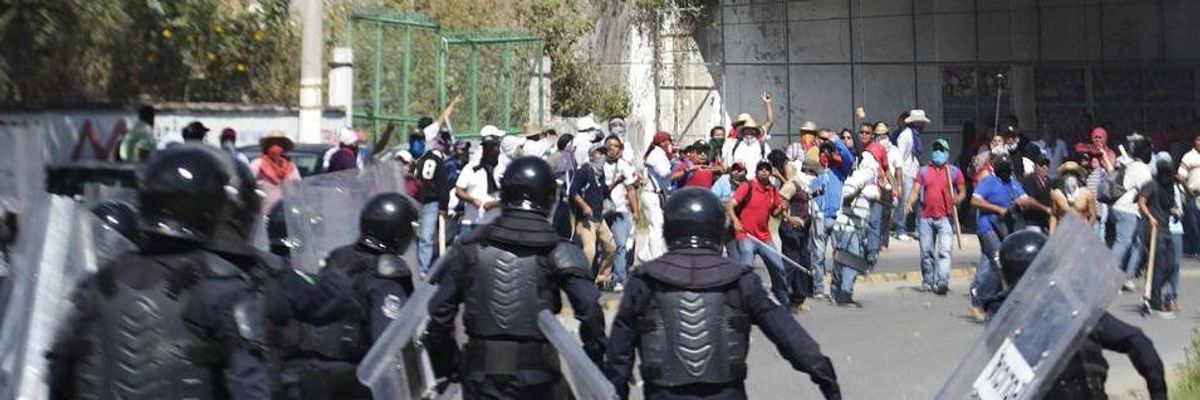Protesters furious at the alleged massacre of 43 Mexican student-teachers, and the government corruption the incident represents, marched in the southern state of Guerrero and set fire to the ruling party's regional headquarters on Tuesday.
The demonstration in Guerrero's capital city of Chilpancingo followed another sizable rally in front of Acapulco's international airport on Monday evening, that one led by parents of the students who gang suspects--in league with corrupt police and government officials--confessed to murdering last week. The students, who had been missing since September 26, were allegedly executed and incinerated by members of the Guerreros Unidos drug gang; their remains have been sent to Austria for possible DNA identification.
According to Deutsche Welle, "About 200 riot police wearing helmets and bearing shields chased more than 1,000 protesters as black smoke billowed from the two-story headquarters of the Institutional Revolutionary Party (PRI) in the Guerrero state capital, Chilpancingo. Tuesday's protests and the police response have left at least three people injured so far, including two journalists."
The alleged killing of the students has ignited massive protests across the country. Some have accused the government of mishandling the case and trying to shut down further investigation. Many are critical of President Enrique Pena Nieto's decision to travel to China for the APEC summit amidst such turmoil. And the entire episode has exposed one of the country's terrible realities: since 2006, 70,000 Mexicans have been killed and some 27,000 "disappeared" as a result of the ongoing narco war.
"The crisis over the students has exposed the depth of the security crisis in parts of Mexico where criminal groups have taken control of some municipal governments, while the federal authorities appear to turn a blind eye," the Guardianreports. "It has also exploded the president's carefully constructed international image as a reformist statesman who has left behind the drug wars associated with a counterproductive offensive against organized crime launched by his predecessor, Felipe Calderon."
In an interview with a Houston newspaper, Dallas Morning News Mexico correspondent and author Alfredo Corchado said the Iguala massacre could be a turning point--if Mexicans seize, and transcend, the moment and the outrage.
"I have covered so many slaughters, I have seen so many ugly things in Mexico that I often say we've already hit bottom," he told the Houston Chronicle. "But we haven't.... I have many doubts about where the bottom is. But I am sure that this [the massacre in Iguala] is a watershed for Mexico. You can't stop talking about this, about the corruption, the drug cartels. You can't remain silent, the government can't remain in denial."
Corchado continued:
I think what happened in Guerrero confirms everything. The situation is very clear. There's corruption among the authorities with the drug cartels, the organized crime....[W]hat happened in Guerrero is very clear. You saw the complicity of local and municipal governments and perhaps state governments. You realize the degree of complicity and impunity at those levels. It's a real chutzpah.
But what worries me most is the apathy in Mexico. A few years ago, a colleague who could not report certain things would give me a call and say, "I can't do it because I'm censored, but here is the information." They were interested in publishing things, but today you call a colleague and he tells you that he doesn't know anything and he doesn't care. Why? Because nobody cares. Then you feel hopeless. There's no hope. I don't think it's like that throughout Mexico, but in some areas people are tired. That is worrisome because it speaks of a civil society, the current Mexico.
There are rallies and protests now, and hopefully they'll continue, but it's not only a matter of going on the streets. People have to learn to hold others accountable.
A national day of mourning, organized under the hashtags

